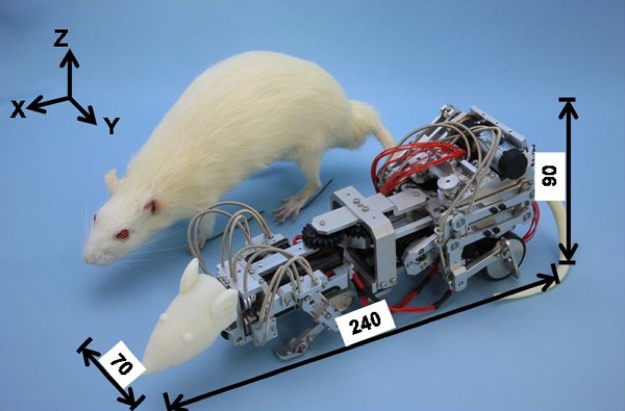 You’d be forgiven for assuming that the life of a lab rat is likely an unhappy one. Cooped up in a small space, living an uncertain existence where the only definite fact about the future is that it will include prodding, pain, and likely death in the name of medical science. For one set of rats in Japan, life is even more bleak, and it’s all because of one new addition to the cage: A robot rat created with the express intent of depressing real rats nearby.
You’d be forgiven for assuming that the life of a lab rat is likely an unhappy one. Cooped up in a small space, living an uncertain existence where the only definite fact about the future is that it will include prodding, pain, and likely death in the name of medical science. For one set of rats in Japan, life is even more bleak, and it’s all because of one new addition to the cage: A robot rat created with the express intent of depressing real rats nearby.
The depressing robot rat was created by scientists at Waseda University in Tokyo, Japan, and goes by the suitably-unexciting name of “WR-3.” The origin of the name is far more straightforward than one might suspect: It’s the third artificial rat created at Waseda, so Waseda Rat 3 = “WR-3.” Fully mobile and remote controlled, WR-3 aims to induce stress and depression in lab animals, thereby creating scenarios where the effects of new drugs to treat depression and other psychological conditions can be more successfully measured. After all, without a robot rat there to ensure that the test subjects were really depressed, how would we really know that an improved mood would be down to the medicine, and not just an unusually good day in ratland?
As for WR-3’s preferred method of depression induction and psychological terror, it’s apparently been arrived at through a process of trial and error. According to a report in New Scientist, the Waseda team – led by Hiroyuki Ishii – tested the robot on two different groups of 12 rats, with differing approaches. Both groups were essentially stressed by the robot continuously over a five day period, although the definition of “continuously” differs in each case; the first group underwent literal continuous attack by WR-3, with the robot harassing the rodents non-stop over the entire period, whereas the second group were subject to harassment only if they moved, and the motion was picked up by motion sensors regardless of whether WR-3 was activated.
Theoretically, the two groups tested if a depressed rat is more likely to remain immobile. After the five day period, both groups were allowed to rest for some weeks before WR-3 was re-introduced into their environment, with the reaction of both groups being measured for differences. As it turned out, the robot generated the biggest depression the second time around in those that had been constantly harassed in earlier life.
Perhaps most worryingly about this is the next step in the testing process: Ensuring the connection between human and rat test subjects. Who is up for being constantly chased by a robot for five days, to see whether or not you get depressed weeks later? Come on, it’s all in the name of science.


